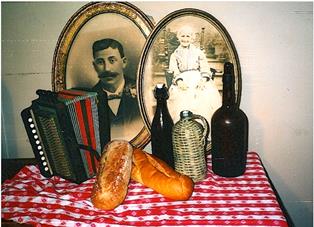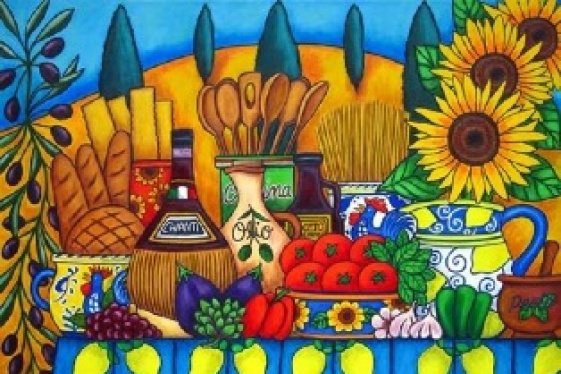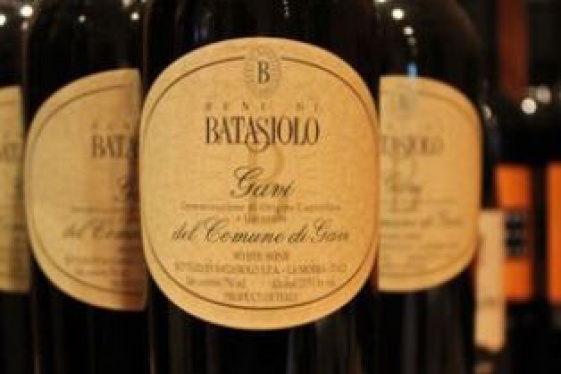

by Cookie Curci
Like most people, I love to eat good food, especially during the holidays, when an abundance of traditional fare is set upon the family table. As an Italian-American, I enjoy the taste, textures, and aromas of the foods of my heritage. To me, these foods represent a continuity of family and tradition. For that reason, I like to prepare these uniquely traditional foods during the Christmas season.
This past holiday, I gave a dinner party for friends and family where I happily served a variety of these traditional family foods. To my non-Italian guests, I explained that some of my dishes were old, ancestral recipes. As my non-Italian guests declined to sample my more exotic foods, it became apparent to me just how different my ancestral fare is from the average family menu. But, it's this very difference that makes it so unique and special to me.
Some of these traditional dishes include squid, stuffed with bread crumbs and baked in tomato sauce; sauteed mustard greens in garlic, olive oil and red pepper flakes; roasted bell peppers bathed in garlic, parsley and olive oil; and baccala stew, eggplant Parmesan, and sliced oranges seasoned with olive oil, garlic salt and black pepper.
Like most kids, I wasn't born liking these unique family foods. My fondness for them developed over the years after sniffing their piquant aromas drifting in from my grandmother's kitchen. Associated with all of these family dishes is a feeling of togetherness, and a sense of well being.
My grandfather believed, like many from the Old Country, that a meal of his favorite foods relieved the tensions of a stressful day. He also believed that our spirit sighs after a good meal and that we should spend that time in rest and reflection.
For me, each taste of these traditional foods rekindles family customs, memories and a sense of legacy. However, to someone who doesn't share my heritage, and has never come face to face with a casserole of baked squid, the sight of these small, tentacled relatives of the octopus can be somewhat unsettling.
To prepare and gather these provincial foods takes extra time and care. But that's all a part of their charm and tradition. Like my mother always says, "Food that is too easily prepared is like opening a bottle of champagne without the 'pop;' it would eliminate half the fun."
Christmas Eve just wouldn't be the same without the robust aroma of Baccala filling the air. This dehydrated salted cod fish comes from the store dried in salt and is the texture of wood until it is soaked in water for 24 hours, with a change of water every few hours. Then it is simmered in a stew pot of spicy tomato sauce and served with white spaghetti. This dish recalls priceless memories for mother–memories that can't be found in today's fast foods.
Many of our family recipes come from the regions of our ancestors: Polenta, butter and flat noodles from the northern area of Italy and seafood and tubular pastas from the south.
I'm fortunate to have had grandparents who came from several regions of Italy. As a child, my grandmother Isolina worked in her father's semolina mill in the town of Abruzzi, in the region of Piscarra. This area, close to the Adriatic Sea, has the best of both worlds and has produced some of the world's finest chefs. The seafood, vegetation and olive groves are plentiful and today is the only saffron-growing region in Italy.
My grandmother Maria came from the small, hilly town of Tricarico, Italy, where meat was scarce and tomato sauces were made from sun-dried tomatoes. Her people had to be much more creative and resourceful with their menu. Dried-pork sausages, beans, peas, pasta and wild mustard greens made up the town's diet.
There is a sense of family continuity and memories that comes along with these traditional foods. Family dishes, like our heritage, are intertwined in our daily lives. They're what connects us to our past.
You may be interested
-
‘Fuggedaboudit’ the motto of new Italian del...
By Kimberly Sutton Love is what brought Tony Nicoletta to Texas from New York.The transpl...
-
“The Hill” St. Louis’ Little Italy
When the fire hydrants begin to look like Italian flags with green, red and white stripes,...
-
1st Annual Little Italy Cannoli Tournament
Little Italy San Jose will be hosting a single elimination Cannoli tournament to coincide...
-
A Week in Emilia Romagna: An Italian Atmosp...
The Wine Consortium of Romagna, together with Consulate General of Italy in Boston, the Ho...
-
An Italian American Feast For Family Reunion...
Hey, come over here, kid, learn something. ... You see, you start out with a little bit of...
-
An Unlikely Union: The love-hate story of Ne...
Award-winning author and Brooklynite Paul Moses is back with a historic yet dazzling sto...
-
Buon Appetito! Unique Italian dining at Ragú...
There's something to be said for having your food prepared tableside. Guacamole tastes fre...
-
Chef Carmelo Mauro to host Beni Batasiolo Wi...
Fiorenzo Dogliani, owner of Beni di Batasiolo, will join Carmelo Mauro for an exclusive wi...










